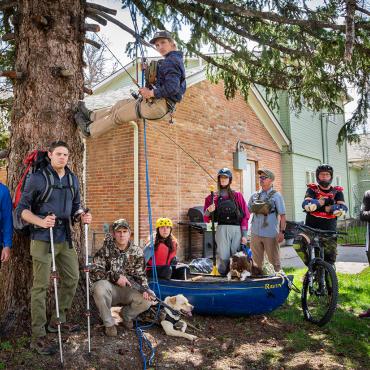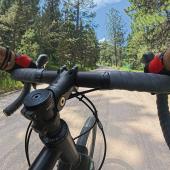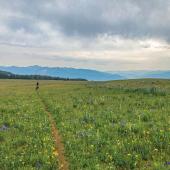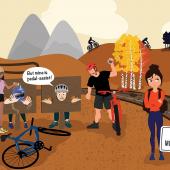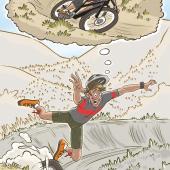Pack It On
A first-timer's guide to bikepacking.
Why would you listen to a newbie when it comes to bikepacking advice? That's a valid question, but odds are, if you're seeking said advice, or are at least interested in the activity, you need whatever info you can get. You're probably about to make all the same mistakes I did — so if you want to have a slightly better experience, take it from someone who just fouled up big time. These are lessons learned from a Memorial Day Weekend epic that covered 90 miles in three days, required no less than five hours of thigh-deep postholing, and included a camp arrival no earlier than 1am. Here goes.
1. Bring more water. While we had a damp May and there is still snow at higher elevations, Montana is a dry state, and the mountains south of Butte, where most of our ride took place, are drier than average. You'll be working very hard all day, so replenishing and staying hydrated is a must. Although water is heavy and takes up a lot of space, bring as much as you can. I would recommend five liters between your bike frame and your pack. I had two and was empty just a few hours in. Without any reliable source for the rest of our ride and even at camp, I didn't get to fill up until day two. This left me weak and disoriented — not a good combo only half-way through a ride.
2. Ride flat pedals. Any longer ride around these parts will more than likely require some hiking. Your bike will be loaded with gear, making balance more difficult, and remote trails have lots of deadfall, meaning you'll be out of the saddle more than you expect. Light hikers or trail runners are a good option, as they'll provide the necessary traction and support, without sacrificing pedal-grip. You might not have as much power on your climbs, but you'd better get used to that anyway, as the extra weight you're carrying will make climbing much harder regardless of the shoes you're wearing.
3. Let your bike do the work. I was riding a full-suspension bike which didn't allow for a frame bag, or at least didn't allow for the frame bag I had available to me. That meant I packed a lot of gear on my back. It sucked. My shoulders were rubbed raw and sore, my back ached from top to bottom, and my neck throbbed from leaning forward to avoid knocking my helmet against my pack. Having a ton of weight on my back also made pushing through snowdrifts and rutted-out trail much harder, sucking necessary energy from my muscles like a Dyson.
4. Ditch the booze. It's no secret that we like our libations 'round these parts. But when weight and space are at a premium, it's better to leave the hooch at home. You'll be so tired after a long day of riding, you won't have the energy, anyway. Plus, it will further dehydrate you, and you don't want to wake up feeling glum. Save the partying for car-camping.
5. Embrace the suffering. Bikepacking is hard. And it's supposed to be. Even if you ride the Bangtail Divide three times a week and are in phenomenal shape, you're going to be tested, and unforeseen developments will come up on the trail that are impossible to plan for. You'll be challenged as much mentality as you are physically, so embrace the suck. Remember that each day will end and a new one will begin; that new day will bring new challenges but also fresh rewards. And cold beer tastes better when you've earned it.

